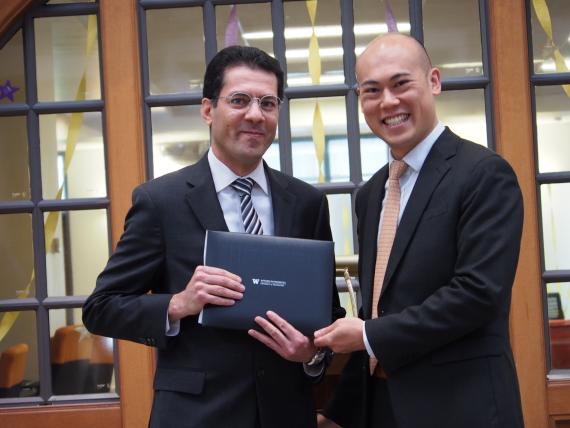By Navid Bahadoran
It was all initiated by my passion towards math and immigrating to the USA.
When I passed the university entrance exam back in my home country, Iran, I was ranked 52nd among more than 200,000 students and entered the best engineering university to start learning electrical engineering. As time passed in my engineering degree journey, I realized that I am mostly interested in math, programming and algorithm parts of the field and did not have any idea what I was going to do in the future. Towards the end of my bachelor’s program, I heard about the opportunities to continue my study overseas specifically in the USA. Unfortunately, I was not lucky enough to get the student visa; however, I was determined to find my own path to move to the USA and pursue an advanced degree that includes a combination of math, programming, and algorithms.
As life went on, I started my career in telecommunications and expanded my professional network. During my career as an engineer, I was engaged in a lot of fascinating work among which project management and budgeting were my favorites. Through my experiences, I encountered a lot of corporate finance concepts. The more I progressed in my job, the more I realized the crucial importance and relevance of financial concepts to modern management and real life. Late 2007 was the breakthrough in my professional life. There was news everywhere about bankruptcy and precipitous loss in stock markets value around the world. Living in a country with a centrally planned economy, I could not understand what was that all about, and why this phenomenon was so important. I could not feel the impact of that huge catastrophe in my day-to-day life. However, it was so prevalent in the news that it made me curious to start reading about it. The more I read about the financial crisis, the more I saw how finance and the economy are advanced in terms of the science behind it. Most of the articles in the newspapers were just superficial explanations of what I recognized was a deeply complicated subject and this motivated me to study finance more conceptually at a higher level and in more disciplined ways.
In 2013 one of my best friends gave me a tip to move to the USA through getting a job visa. When I moved to the United States and settled in my immigration’s status, I started exploring financial engineering and business administration programs in several universities across the nation. After attending a couple of info sessions, I realized that the Computational Finance and Risk Management (CFRM) program at University of Washington is well aligned with my passion. I still remember my first meeting with the CFRM advisors at the info session and my first invite to the CFRM gathering at Still Bar in Capitol Hill.
I started the program in 2020, right in the middle of the pandemic. Although the lack of social life was very challenging, but the friendly environment and the support from the CFRM team was amazing. Very soon I was assured that I am in the right track and my confidence was boosted by the diversity of the courses that were being offered. The faculties also played a major role in conveying complicated concepts in a very intuitive way which made it easier to enhance my knowledge in a wide range of new concepts and empowered me to join the job market by opening the broad array of career opportunities. Although job hunting was challenging and my introvert personality and imposter syndrome hurt me a lot in this part of the journey, fortunately, with Karen Beaudry’s help and my friends’ support I landed on a very instructive internship which led me to get a high-level full-time job at State of Wisconsin Investment Board (SWIB).
For me the CFRM not only was the graduate program which introduced me to a variety of academic and carrier opportunities but also the environment which helped me building a new supportive family. This is a community that you can always count on and seek help from when needed. Every moment in the program was memorable, but the brightest and the proudest reminiscence in my CFRM journey was the time that I was recognized by the department and peers to receive two awards for “Academic Achievement” and “Peer Leadership”. Those awards assured me that my efforts have been paid off.
I am honored to be part of the CFRM program and community and excited to leverage the skills I have learned as I am growing into my career.
